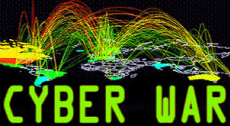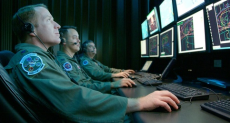
Email: ZYVC057@live.rhul.ac.uk
Total Article : 213
About Me:I'm a graduate student studying International Criminal Law and first started writing for King's News almost 4 years ago! My hobbies include reading, travelling and charity work. I cover many categories but my favourite articles to write are about mysteries of the ancient world, interesting places to visit, the Italian language and animals!

Sun-Tzu highlighted the importance of spies to gain ‘the knowledge of the enemy’s true situation’. With wars being more versatile than ever before, today one of the most effective ways of obtaining critical information at an outstandingly fast speed is through cyber espionage, the act of spying on someone through technology. Cyberwar occurs when we force another entity to comply through acts involving high intelligence software and intricate computing analysis without the use of physical violence but with war-like intent. This appears to fulfil Sun-Tzu’s wish of winning a war without actually fighting. Its benefits range from information gathering to avoid possible threats such as terrorist or surprise attacks, new employment in the world of computing in particular for military-trained individuals, the decrease in open wars that can cause thousands of deaths and the substitution of guns and psychical violence for data hacking and intelligence analysis.
Cyber warfare violates personal freedom but seeing as it is utilised by multiple nations, if one were to stop or condemn its use in a state then that state would have a bleak chance of winning any war, as it would have allowed other nations to have a high-impact technological advantage. Having stated this, even larger countries are now increasingly concerned with their own cyber security being breached. The Economist recognises cyber warfare as the ‘fifth domain in warfare’ and that it is potentially as dangerous as nuclear arms as ‘nobody knows their true power, so countries must prepare for the worst’ (The Economist 2010).
The high-effective use of cybercrime emerged in 2010 when an innovative software known as Stuxnet, an unrecognised source typically traced to the US possibly with the aid of Israel, targeted the motors of centrifuges of multiple Iranian plants, slowing them down and damaging approximately 1,000 parts. Although it did not necessarily prohibit Iran from producing uranium, it did bring substantial physical damage to Iranian nuclear infrastructure and was an intensely intricate method of causing indirect stagnation to the enemy. It also signified a new era of warfare in which ‘Cyber Command is the newest global combatant and its sole mission is cyberspace, outside the traditional battlefields of land, sea, air and space’ (The Passive Voices 2011).

Cyber warfare strategies work best in asymmetric wars, when one nation distinctively has a technological advantage and the other country does not have the financial means or the infrastructure to use such intricate computing analysis. It is a mechanism of dismantling the enemy from within in a manner so sophisticated and delicate that its very own tracks are widely untraceable. It can also be used to hack the enemy’s propaganda which targets the adversary indirectly through public support. It is here where the use of cyber surveillance can actually be incorporated within the doctrine of psychological warfare by altering the perceptions of the adversary’s followers discreetly; alternatively it can be used to mock the enemy. A classic case is the highly entertaining hacking on behalf of the British MI6 and GCHQ which hacked into Al Qaeda websites with the intent of disrupting the terrorist’s group attempt of recruiting new members (Gardham 2011). Allegedly, the operation was used to alter substantial instructions on the website regarding how to make a bomb and they were able to substitute this manual with one on how to make cupcakes. The ability to both extract information from the enemy, such as warfare tactics and plans, and to then control the system from within which allows us to alter the enemy’s work, is such an intricate, vital tactic that any actor in search of victory must have; if not, it risks being the underdog in the new era of cyber combat.
Image 1: http://i1-news.softpedia-static.com/images/news-700/Existence-of-Cyber-Warfare-Unit-Confirmed-by-German-Authorities.png
Image 2: http://blogs-images.forbes.com/quora/files/2014/07/main-qimg-111111bda111111111111cc11f111111c11b11e111111110df1111

0 Comment:
Be the first one to comment on this article.